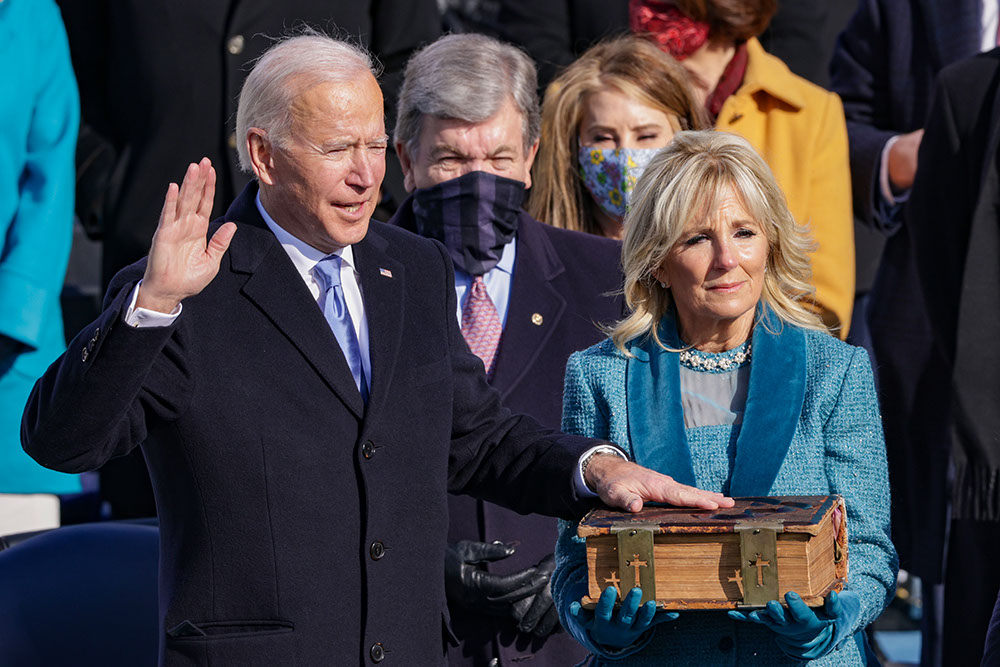Law and justice under a Biden administration

Introduction
This article was proposed to a meeting of the Bar News Committee on 8 December 2020. Four weeks later, a mob stormed the United States Capitol. These days, it is difficult to make lasting predictions about American politics.
This article briefly surveys the implications for American law and justice of a Biden administration, as the new President and his cabinet seek to implement their reform agenda against a backdrop of partisan animosity, economic crisis, public demands for change and a global pandemic. In particular, this article addresses three key topics: appointments to senior posts and the judiciary; criminal justice; and immigration.
Key personnel and the courts
President Biden briefly practised as an attorney before his election to the United States Senate in 1972.1 During his long career in national politics, President Biden’s legal policy priorities have shifted with the prevailing mood of the nation and his party. As chair of the Senate Judiciary Committee from 1987 to 1995, he presided over the committee’s hearings on Clarence Thomas’s nomination to the US Supreme Court; he was criticised for his failure to appropriately support Anita Hill’s allegations of sexual misconduct, and has subsequently expressed regret for Professor Hill’s treatment by the committee.2 (Further shifts in Biden’s political stances are described below.) Biden’s Vice President, Kamala Harris, is a former Senator for California. In a varied career in the law Harris had worked as a prosecutor, San Francisco District Attorney and Attorney-General of California.
President Biden’s nominee for Attorney-General is Merrick Garland, a judge of the US Court of Appeals for the DC Circuit since 1997. Garland was President Obama’s nominee to replace the late Antonin Scalia as a justice of the US Supreme Court; notoriously, the Republican majority in the Senate refused to consider Garland’s nomination for the seat. Before his appointment to the DC Circuit bench, Garland was a litigator and federal prosecutor. Biden’s nominee for Deputy Attorney-General, Lisa Monaco, is a former prosecutor and attorney with the US Department of Justice, who served for four years as President Obama’s Assistant to the President for Homeland Security and Counterterrorism.
There is a significant prospect that a vacancy may arise on the US Supreme Court during President Biden’s administration. Stephen Breyer, the oldest member of the Court, is 82 years old and has served since 1994. During the campaign, President Biden promised that he would appoint a black woman to the Supreme Court if elected.3 Justice Leondra Kruger of the California Supreme Court and Judge Ketanji Brown Jackson of the US District Court for the District of Columbia have frequently been mentioned as potential nominees.4
During the campaign, there was also considerable speculation as to whether a Biden administration would press to increase the size of the Supreme Court (which has had nine justices since 1869).5 Six of the current Supreme Court justices were appointed by Republican presidents, whereas only three were appointed by Democrats. However, these proposals (if embraced by the administration – which appears very unlikely6) appear unlikely to receive the support of Congress, given the Democrats’ very thin majority and reliance on conservative members of their caucus in the Senate.
Criminal justice
Millions of Americans took part in protests in support of the Black Lives Matter movement in 2020, spurred both by public outrage at police discrimination and violence against African Americans (including the deaths of Breonna Taylor, Ahmaud Arbery and George Floyd) and by the Trump administration’s hostile response to the movement.7 The new Biden administration needs to reckon with public demands for reforms to America’s criminal justice system – and with scepticism towards Biden himself in light of his past positions.8 As a leading advocate for the Violent Crime Control and Law Enforcement Act 1994 (US), Biden has been condemned for his role in promoting legislation ‘that criminal justice experts and critics say helped lay the groundwork for the mass incarceration that has devastated America’s black communities’;9 Biden has since admitted that his support for the Act was a mistake.10
Since the 1990s, Biden’s stances on criminal justice issues have shifted and liberalised. In his 2020 presidential campaign Biden supported the decriminalisation (although not the legalisation) of marijuana and the elimination of the death penalty.11 Other policy initiatives include the elimination of federal mandatory minimum sentences and increased funding for preventative alternatives to incarceration, juvenile justice and public defenders’ offices.12 Since the inauguration, the Biden administration has already moved not to renew federal contracts with private prisons – pursuant to a policy to ‘reduce profit-based incentives to incarcerate’.13
Immigration
President Trump’s policies on immigration and asylum sparked intense domestic and international controversy. The Trump administration indefinitely suspended the grant of new visas to citizens of several (initially predominantly Muslim-majority) countries (subject to waivers and exceptions),-1 a policy initially implemented in a chaotic and uncertain manner.-1 Despite the Trump administration’s pledge to build a wall along the US-Mexico border, ‘it [was] through policy changes, not physical barriers, that his administration [was] able to diminish the flow of migrants into the United States’-1 – including new restrictive criteria for permanent residence ('green cards'), reduced grants of visas to non-citizens seeking to immigrate to the United States and, notoriously, a policy of criminal prosecutions of adults who illegally crossed the United States border. This latter policy coincided with, and contributed to, a substantial increase in the separation of children from their parents.-1 Despite the repeal of the policy in June 2018, more than 1000 children remained separated from their parents as of February 2021, with 500 children yet to be located.-1 Some parents have been deported without their children, and some children have been deported without their parents.-1
Immigration reform has been an early priority of the Biden administration. Within weeks of the inauguration, the administration issued a 100-day moratorium on most deportations-1 and ordered immigration officials ‘to seek federal approval before moving to deport undocumented people who have been in the United States for a considerable amount of time without committing felonies or being classified as national security threats’.-1 On Biden’s first full day in office, he proposed a new US Citizenship Act allowing undocumented individuals in the United States to apply for permanent residence after five years’ residence (subject to conditions), and to apply for citizenship after a further three years’ residence.-1 The bill also proposes abolition of 'the three and ten-year bars' – under which persons may be barred from being admitted to the United States for three years (if they unlawfully reside in the United States for more than 180 days in a single stay) or ten years (if they unlawfully reside in the US for more than a year).-1 Also on Biden’s first full day in office, he ended the Trump ‘travel ban’ by executive order.-1 But the administration has already faced early criticism for points of continuity between its policies and those of its predecessors; in late February, the administration were accused of hypocrisy following the re-opening of a facility in Texas for the detention of undocumented teenagers.-1

Photo by Alex Wong, Getty Images
Conclusion
The Biden administration has assumed office during an international health crisis, domestic unrest and intense partisan division. In many respects, its policies offer a sharp departure from those of its predecessor. However, there is a significant prospect that institutional gridlock (particularly through the increasing paralysis of the US Senate) will slow or even frustrate the administration’s proposed reforms. Moreover, as noted at the outset, it is difficult to make confident predictions about the direction and intensity of American politics – now more than ever.
ENDNOTES
1 Matt Flegenheimer and Katie Glueck, ‘Joe Biden’s Non-Radical 1960s’, The New York Times, 17 October 2020, <https://www.nytimes.com/2020/10/17/us/politics/joe-biden-college-1960s.html>.
2 Sheryl Gay Stolberg and Carl Hulse, ‘Joe Biden Expresses Regret to Anita Hill, but She Says ‘‘I’m Sorry’ Is Not Enough’, The New York Times, 25 April 2019, <https://www.nytimes.com/2019/04/25/us/politics/joe-biden-anita-hill.html>; Lisa Lerer, ‘Joe Biden Says He Regrets Role in Anita Hill Hearing’, The New York Times, 26 March 2019, <https://www.nytimes.com/2019/03/26/us/politics/biden-anita-hill.html>.
3 Eugene Scott, ‘Attention to Biden’s earlier pledge to nominate a Black woman to the Supreme Court increases’, The Washington Post, 21 September 2020, <https://www.washingtonpost.com/politics/2020/09/20/attention-bidens-earlier-pledge-nominate-black-woman-supreme-court-increases/>.
4 See e.g. Noah Feldman, ‘Breyer Retirement Could Lead to Court’s First Woman’, Bloomberg, 13 August 2020, <https://www.bloomberg.com/opinion/articles/2020-08-13/meet-joe-biden-s-likeliest-supreme-court-nominees>; Debra Cassens Weiss, ‘Biden has pledged to nominate a black female SCOTUS justice – who are the possibilities?’, ABA Journal, 9 November 2020, <https://www.abajournal.com/news/article/biden-has-pledged-to-nominate-a-black-female-justice.-who-are-the-possibilities>.
5 See e.g. Astead W. Herndon and Maggie Astor, ‘Ruth Bader Ginsburg’s Death Revives Talk of Court Packing’, The New York Times, 19 September 2020, <https://www.nytimes.com/2020/09/19/us/politics/what-is-court-packing.html>.
6 Charlie Savage and Katie Glueck, ‘Biden Punts on Expanding the Supreme Court, Calling for a Panel to Study Changes’, The New York Times, 22 October 2020, <https://www.nytimes.com/2020/10/22/us/politics/biden-supreme-court-packing.html>.
7 Astead W. Herndon and Dionne Searcey, ‘How Trump and the Black Lives Matter Movement Changed White Voters’ Minds’, The New York Times, 27 June 2020, <https://www.nytimes.com/2020/06/27/us/politics/trump-biden-protests-polling.html>.
8 Justin Blake, ‘Joe Biden, Black Lives Matter activists helped you win Wisconsin. Don’t forget us’, The Guardian, 16 November 2020, <https://www.theguardian.com/commentisfree/2020/nov/16/joe-biden-black-lives-matter-wisconsin-jacob-blake>.
9 Sheryl Gay Stolberg and Astead W. Herndon, ‘‘Lock the S.O.B.s Up’: Joe Biden and the Era of Mass Incarceration’, The New York Times, 25 June 2019, <https://www.nytimes.com/2019/06/25/us/joe-biden-crime-laws.html>.
10 Lauren Gambino, ‘‘Things have changed’: can Biden overcome the racist legacy of the crime bill he backed?’, The Guardian, 17 October 2020, <https://www.theguardian.com/us-news/2020/oct/17/joe-biden-race-crime-bill-1994-policing>.
11 Katie Glueck, ‘Biden, Scrutinized For Crime Bill, Unveils Plan to Reduce Mass Incarceration’, The New York Times, 23 July 2019, <https://www.nytimes.com/2019/07/23/us/politics/biden-criminal-justice.html>.
12 ‘The Biden Plan for Strengthening America’s Commitment to Justice’, Biden for President, <https://joebiden.com/justice/>.
13 Jim Tankersley and Annie Karni, ‘Biden Moves to End Justice Contracts with Private Prisons’, The New York Times, 26 January 2021, <https://www.nytimes.com/2021/01/26/business/biden-private-prisons-justice-department.html>.
14 Rick Gladstone and Satoshi Sugiyama, ‘Trump’s Travel Ban: How It Works and Who Is Affected’, The New York Times, 1 July 2018, <https://www.nytimes.com/2018/07/01/world/americas/travel-ban-trump-how-it-works.html>. The initial countries subject to the ‘travel ban’ were Iran, Libya, North Korea, Somalia, Syria and Yemen. The ‘ban’ was later extended to Myanmar, Eritrea, Kyrgyzstan, Nigeria, Sudan and Tanzania.
15 Michael D. Shear and Ron Nixon, ‘How Trump’s Rush to Enact an Immigration Ban Unleashed Global Chaos’, The New York Times, 29 January 2017, <https://www.nytimes.com/2017/01/29/us/politics/donald-trump-rush-immigration-order-chaos.html>.
16 Zolan Kanno-Youngs, ‘As Trump Barricades the Border, Legal Immigration Is Starting to Plunge’, The New York Times, 24 February 2020, <https://www.nytimes.com/2020/02/24/us/politics/trump-border-legal-immigration.html>.
17 Miriam Jordan, ‘Family Separation May Have Hit Thousands More Migrant Children Than Reported’, The New York Times, 17 January 2019, <https://www.nytimes.com/2019/01/17/us/family-separation-trump-administration-migrants.html>; Michael D. Shear, Katie Benner and Michael S. Schmidt, ‘‘We Need To Take Away Children,’ No Matter How Young, Justice Dept. Officials Said’, The New York Times, 6 October 2020, <https://www.nytimes.com/2020/10/06/us/politics/family-separation-border-immigration-jeff-sessions-rod-rosenstein.html>.
18 Miriam Jordan, ‘Separated Families: A Legacy Biden Has Inherited From Trump’, The New York Times, 1 February 2021, <https://www.nytimes.com/2021/02/01/us/immigration-family-separations-biden.html>.
19 Ibid.
20 Ed Pilkington, ‘Outcry as more than 20 babies and children deported by US to Haiti’, The Guardian, 9 February 2021, <https://www.theguardian.com/us-news/2021/feb/08/us-ice-immigration-customs-enforcement-haiti-deportations>.
21 Giovanni Russonello, ‘Why Biden Is Tackling Immigration Now’, The New York Times, 22 February 2021, <https://www.nytimes.com/2021/02/22/us/politics/biden-immigration-plan.html>.
22 ‘Fact Sheet: President Biden Sends Immigration Bill to Congress as Part of His Commitment to Modernize our Immigration System’, The White House, 20 January 2021, <https://www.whitehouse.gov/briefing-room/statements-releases/2021/01/20/fact-sheet-president-biden-sends-immigration-bill-to-congress-as-part-of-his-commitment-to-modernize-our-immigration-system>.
23 Ibid; ‘Unlawful Presence and Bars to Admissibility’, US Citizenship and Immigration Services, <https://www.uscis.gov/laws-and-policy/other-resources/unlawful-presence-and-bars-to-admissibility>.
24 Amanda Holpuch and Lauren Gambino, ‘Joe Biden reverses anti-immigrant Trump policies hours after swearing-in’, The Guardian, 21 January 2021, <https://www.theguardian.com/us-news/2021/jan/20/biden-immigration-reform-trump-executive-order>.
25 Brett Samuels, ‘White House defends reopening of facility for migrant kids’, The Hill, 23 February 2021, <https://thehill.com/homenews/administration/540087-white-house-defends-reopening-of-facility-for-migrant-kids>.